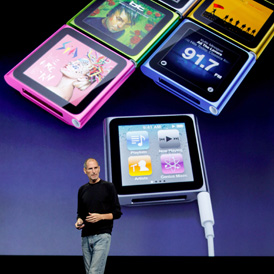A one-man brand: can Apple survive without Jobs?
As Steve Jobs quits as Apple boss, Channel 4 News looks at the power of the company’s creative guru and what happens when you build a brand around one man.
In his trademark uniform of jeans, sneakers and black turtlenecks, Steve Jobs is the man behind the iconic Apple gadgets which have inspired an almost cult-like following, including the iPod, iPhone and the iPad.
He has been the public face of just about every major product launch in the past decade.
Stocks in Apple plunged more than 5 per cent after the announcement that Jobs, who is battling pancreatic cancer, would step down and hand over the top job to chief operating officer, Tim Cook.
Richard Merrin, managing director of PR agency Spreckley, told Channel 4 News that it is rare to find someone as charismatic and powerful as Jobs to spearhead a company’s brand.
“Jobs is an extraordinary visionary, he’s synonymous with the Apple brand. But you don’t come across someone like that very often.

“If you look back over the course of the company’s history, every time Jobs has left or taken a break because of his health, the company’s been seen as losing direction and focus. Then he returns and stock increases.”
Jobs has been lauded as being the saviour of Apple, after turning around the company’s profits when he returned to Apple a decade after the company’s slump in the mid-1980s.
But Mr Merrin told Channel 4 News that there are potential dangers with building a brand around one person.
“In the early stages it’s wise to have a front man to drive forward the vision of a company.
“But over time, as the company builds its name, it’s sensible to step back.”
Soundbites from the Apple visionary
“There’s an old Wayne Gretzky quote that I love: ‘I skate to where the puck is going to be, not where it has been.’ And we’ve always tried to do that at Apple. —Steve Jobs during the introduction of the iPhone
“When you’re a carpenter making a beautiful chest of drawers, you’re not going to use a piece of plywood on the back, even though it faces the wall and nobody will ever see it. You’ll know it’s there, so you’re going to use a beautiful piece of wood on the back. For you to sleep well at night, the aesthetic, the quality, has to be carried all the way through. -Steve Jobs In a Playboy interview Feb 1985, a few months before being fired
Leading Apple’s evangelists
He likened Jobs’ power over the Apple “evangelists” to Richard Branson’s brand-power as the head of Virgin. But he said Branson had tried to scale back his role in recent years.
“He built up the Virgin empire, but as the years progessed, Branson has consciously begun to step back.
“That’s the interesting thing with Apple because the tragedy here is that Jobs’ battle with cancer has forced him to step aside. So the circumstances are quite different,” he said.
Faisal Islam on ‘Meeting the Henry Ford of the digital generation’
The first time I met Steve Jobs he hastily ended the interview. In 2000 I was conducting a joint interview in Paris with a French newspaper, and French retailers were increasingly concerned that Apple itself was muscling in on their market. As I recall, the lime green Macbook was only available directly from Apple.
Read more
But while plummeting stocks on Wall Street indicated that investors might be nervous about Jobs’ replacement, Mr Merrin said Apple would have been planning the leadership change for years.
“It might be bumpy for a while, but I think Apple’s success is extremely secure.
“There’s been a very long build-up to this and a lot of planning would have gone into ensuring the company’s future.
“The most important thing to remember is that when a company comes to maturity, it can’t rest on the shoulders of one individual. It needs to pass the mantle on to the next generation if it’s going to survive.”
Jobs’ health has long been a concern for Apple investors. He went on leave in January, his third medical absence since 2004. He also underwent an operation for pancreatic cancer in 2004 and received a liver transplant in 2009.
Jobs is also credited with his success as CEO at computer company Next, and animation company Pixar, which produced Toy Story during his time at the company.
-
Latest news
-
Taylor Swift’s new break-up album breaks records3m

-
NHS trust fined £200K for failings that led to death of two mental health patients3m

-
Sunak vows to end UK ‘sick note culture’ with benefit reform3m

-
‘Loose talk about using nuclear weapons is irresponsible and unacceptable’, says head of UN’s nuclear watchdog3m

-
‘There wasn’t an Israeli attack on Iran,’ says former adviser to Iran’s nuclear negotiations team7m

-




